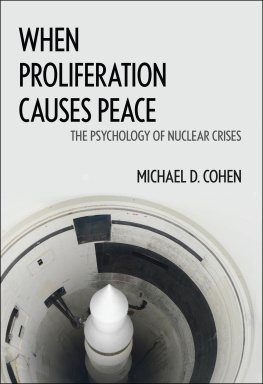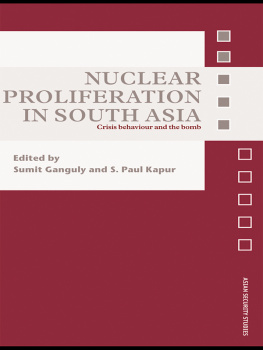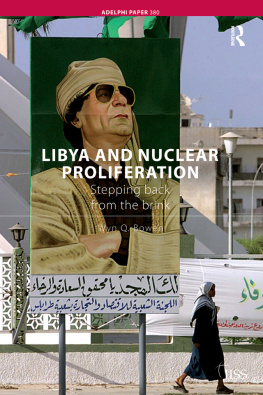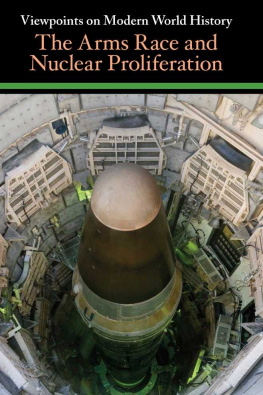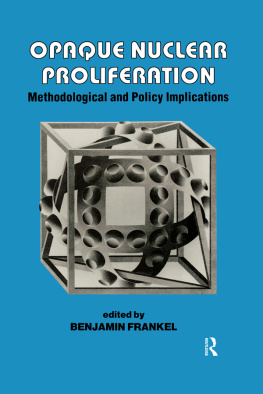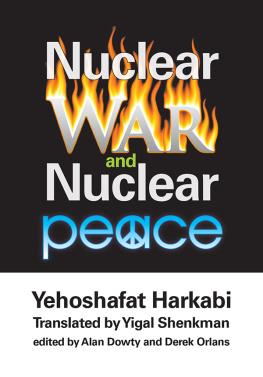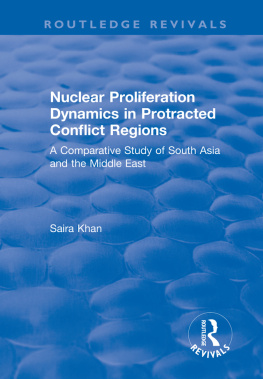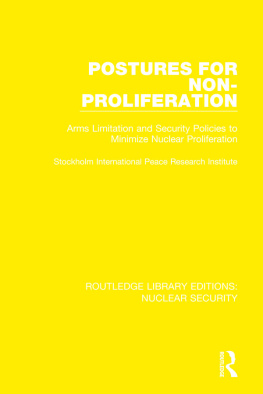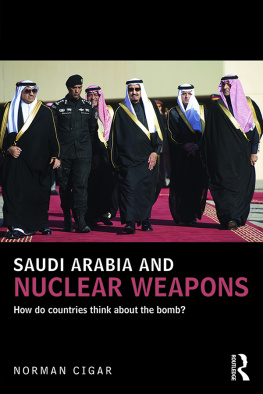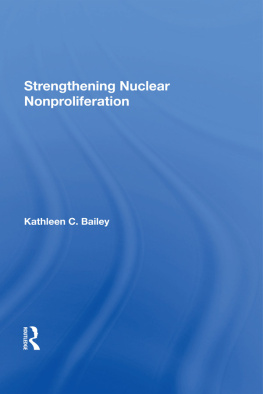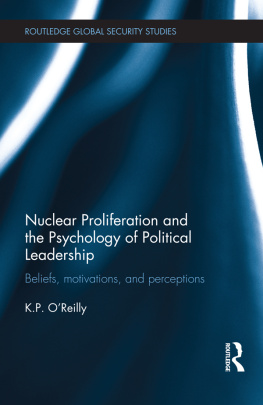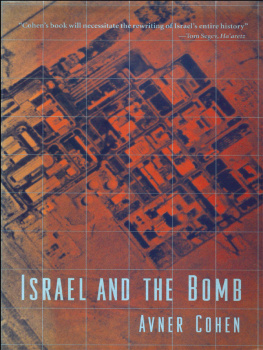2017 Georgetown University Press. All rights reserved. No part of this book may be reproduced or utilized in any form or by any means, electronic or mechanical, including photocopying and recording, or by any information storage and retrieval system, without permission in writing from the publisher.
The publisher is not responsible for third-party websites or their content. URL links were active at time of publication.
Library of Congress Cataloging-in-Publication Data
Names: Cohen, Michael D., PhD, author.
Title: When Proliferation Causes Peace : The Psychology of Nuclear Crises / Michael D. Cohen.
Description: Washington, D.C. : Georgetown University Press, 2017. | Includes bibliographical references and index.
Identifiers: LCCN 2017002309 (print) | LCCN 2017008144 (ebook) | ISBN 9781626164949 (hc : alk. paper) | ISBN 9781626164956 (pb : alk. paper) | ISBN 9781626164963 (eb)
Subjects: LCSH: Nuclear crisis control. | Nuclear weapons--Government policy. | Nuclear nonproliferation. | International relations.
Classification: LCC JZ5675 .C62 2017 (print) | LCC JZ5675 (ebook) | DDC 327.1/747dc23
LC record available at https://lccn.loc.gov/2017002309

This book is printed on acid-free paper meeting the requirements of the American National Standard for Permanence in Paper for Printed Library Materials.
18 17 9 8 7 6 5 4 3 2 First printing
Printed in the United States of America
Cover design by 4 Eyes Design
ACKNOWLEDGMENTS
I HAVE PUZZLED at the strikingly different effects that nuclear weapons have exerted on state foreign policy and international politics since my undergraduate days. How are the weapons that sometimes threaten interstate adversaries and their regions with imminent destruction able to at other times act as the apparent source of geopolitical stability? This book argues that nuclear proliferation is dangerous when leaders learn that nuclear assertion is safe but also that it can become safer when they learn that nuclear assertion is dangerous. I have accumulated many debts along the way. John Hobson and Jason Sharman, then at the University of Sydney, consolidated my interest in international politics. In an introductory undergraduate class on international relations theory in 2000, and during an honors thesis year in 2003, when I somehow ended up exploring the psychological sources of sixteenth-century Spanish imperial conquests, John probably unwittingly pushed me onto this career path. Jason has been a more recent source of encouragement and feedback, and I will miss him as he heads to the University of Cambridge.
I have been very fortunate to receive guidance and support from Dick Price, Alan Jacobs, and Patrick Morgan at the University of British Columbia. Dick permitted me to follow my curiosity while ensuring that I maintained a focus on the broader international relations landscape. Pat Morgan continues to amaze me with his knowledge of nuclear weapons and deterrence and was a great initial sounding board for many of the ideas developed here. Alan Jacobs ensured that the research design and methodological choices were held to (his own) very high standards. I am thankful for these three fine scholars commitment to my own intellectual development. I am also thankful to Nathan Allen, Adam Bower, Arjun Chowdhury, Fred Cutler, Nic Dragojlovic, Wade Huntley, Brian Job, John McAndrews, Ben Nyblade, and John Voortman, all at UBC, for their constant source of encouragement and feedback. I am grateful to P. R. Chari at the Institute of Peace and Conflict Studies in Delhi for hosting me for a month and for offering many helpful introductions. Also worthy of special mention is John M. Owen, who during his annual summer sojourns to Vancouver was kind enough to share his reactions to my ideas and his swimming poolsometimes at the same timeon many occasions.
My debts have continued to mount since leaving Vancouver. I owe a special debt of gratitude to Sten Rynning at the University of Southern Denmark for offering what became my first academic position. Most of this book was written there, and I am especially thankful to Sten as well as to Erik Albaek, Arjen van Dalen, Peter Viggo Jakobsen, Bob Klemmensen, Paul Marx, Asbjorn Norgaard, Niels Bjerre Poulsen, and Casper Sylvest for providing such a wonderful academic environment. I am deeply grateful to Soren and Lisbeth Hesseldahl for welcoming my family and I to Denmark with such great hospitality and good humor.
My greatest academic thanks go to Robert Jervis. He invited me to spend the fall of 2014 at Columbia University to complete this book. Upon arriving and having my first meeting with Bob, I presented a long and detailed reviewers memo that had generated some reactions on my part and had led to further questions that I was keen to discuss. He smiled and informed me that he had written the memo. Bobs knowledge about history, international relations, nuclear weapons, and political psychology continues to astound me. I could not have asked for a better mentor, and this book is far better as a result of his critical input over several often-lengthy discussions. I am thankful for a mini workshop Bob hosted on an article-length start of this book, and I appreciate the comments of Peter Clement, Mike Horowitz, Jack Levy, Peter Liberman, Kimberly Marten, Jack Snyder, and Keren Yarhi-Milo. Further afield, I am grateful to Debbie Larson, Paul MacDonald, Jonathan Mercer, and Todd Sechser, all of whom offered detailed and helpful comments on multiple chapters even in the face of their own research commitments. For other helpful insights on the psychological sources of foreign policies and nuclear weaponsrelated issues I benefited from discussions or correspondence with Taylor Fravel, Frank Gavin, Jacques Hymans, Tim Naftali, Vipin Narang, and Brian Rathbun. I am also very grateful for very helpful feedback by the external reviewers. In 2015 an opportunity arose to relocate to my hometown of Sydney, and I am thankful to Natalie Klein and Ben Schreer at the Department of Security Studies and Criminology at Macquarie University for a rewarding first year. Last, but not least, I thank Don Jacobs at Georgetown University Press for guiding me through the editorial process. I am astounded at the immense capacity of all those that have helped me write this book, and I am thankful to everyone. I apologize if I have missed anyone.
My sources of scholarly support pale in comparison to that provided by my loving and supportive family. My mother has encouraged my pursuit of scholarship for as long as I can remember, and I am deeply thankful for her support throughout my life in Sydney, Vancouver, Denmark, and now Sydney again. My father encouraged me to pursue my dreams, and I was lost for words when he passed away two weeks after I returned to Sydney. My sons, Samuel and Robbie, were born during graduate school years and have provided an endless source of love, joy, and engagement; they always find a way to force on me the need to spend some time away from writing. My newborn daughter, Sofia, has enriched my life in all sorts of ways. My parents-in-law, Tim and Georgina, have frequently asked about this book and have been great sources of encouragement and stimulation along the way.

 This book is printed on acid-free paper meeting the requirements of the American National Standard for Permanence in Paper for Printed Library Materials.
This book is printed on acid-free paper meeting the requirements of the American National Standard for Permanence in Paper for Printed Library Materials.
